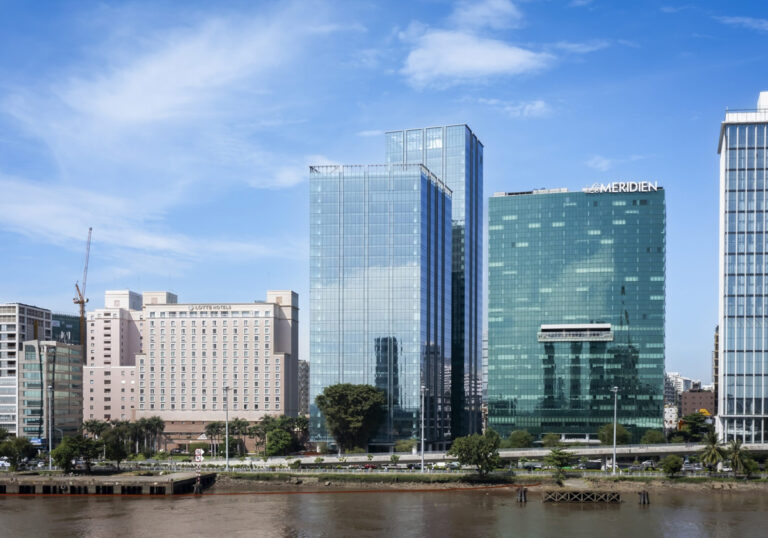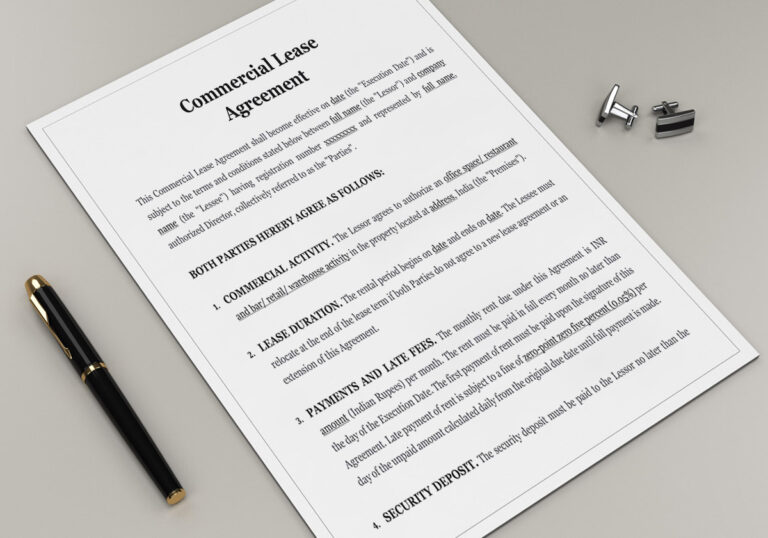Common Office Rental Mistakes to Avoid in Vietnam

Renting an office space in Vietnam can be a complex process, particularly for businesses unfamiliar with the market. Whether you’re a foreign company entering the market or a local business relocating or expanding, overlooking key details can lead to costly mistakes. Understanding the most common office rental mistakes Vietnam is essential for making informed and cost-effective decisions.
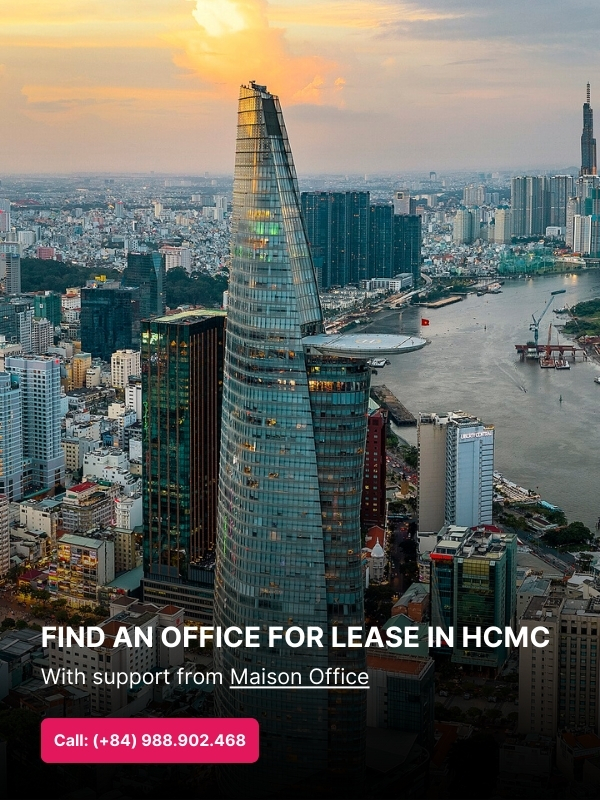 |
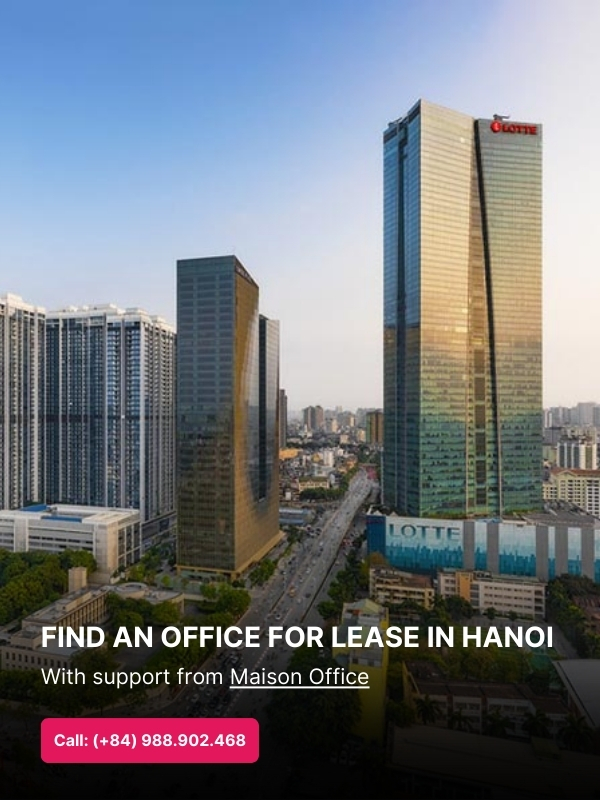 |
Table of Contents
- 1. Misunderstanding the rental area calculation
- 2. Skimming through the lease agreement
- 3. Ignoring service charges and hidden costs
- 4. No early termination or flexibility clauses
- 5. Ambiguous deposit and guarantee refund terms
- 6. Choosing a building that doesn’t match operational needs
- 7. Overlooking fit-out timeline and rent-free period
- 8. No limit on future rental or service charge increases
- 9. Not clarifying maintenance responsibilities
- 10. No legal or advisory support during lease review
- 11. Renting from landlords without proper licenses or compliance
1. Misunderstanding the rental area calculation
Many tenants mistakenly assume that the office rental area they’re paying for is fully usable, without understanding the difference between gross leasable area and net usable area.
– Gross Leasable Area (GLA): Refers to the total floor space used to calculate rent, including both the actual usable office space and shared areas such as lobbies, corridors, restrooms, elevators, as well as space taken up by walls and columns.
– Net Usable Area (NUA): Refers to the actual space within an office building that the tenant can exclusively use, including workspaces such as desks, meeting rooms, and individual working areas. It accurately reflects the space that a business can utilize for its operations.
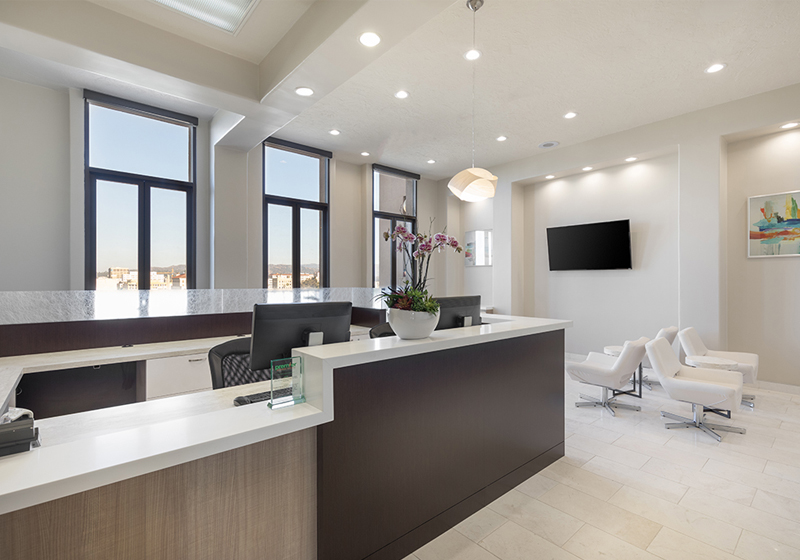
This misunderstanding can lead tenants to pay a higher effective cost per usable square meter than expected. As a result, budgeting, space planning, and overall value evaluation can be negatively affected.
Solution: Before signing any office lease, businesses should request a clear floor plan showing both the gross and net areas, along with a breakdown of how the total rentable space is calculated. This transparency allows for more accurate evaluation of the true cost per usable square meter. It’s also advisable to have the calculation method documented in the lease agreement to prevent disputes later.
>> What’s the difference between Net area vs Gross floor area?
2. Skimming through the lease agreement
One of the most common mistakes renting office Vietnam is skimming through or overlooking the details of the lease agreement. Missing important terms such as dispute resolution procedures, renewal terms, and liability responsibilities can lead to costly problems later.
– Dispute resolution: Without clear procedures, resolving disagreements can become lengthy and expensive. Some contracts specify arbitration or mediation, which may be faster and less costly than court trials.
– Renewal terms: Tenants need to know whether and how they can renew the lease, as well as any rent adjustments. Overlooking this may result in forced relocation or unexpected rent increases.
– Liability and maintenance responsibilities: Contracts should clearly define who is responsible for repairs and upkeep of the property. and upkeep of the property.
– Termination and penalty clauses: If these terms are unclear, businesses may face heavy fines if they need to exit the lease prematurely. Clear understanding of these provisions helps avoid unexpected costs and legal issues.

Solution: To avoid these pitfalls, tenants should take the time to read the entire lease carefully, seek legal or advisory support if needed and also clarify any ambiguous terms before signing. Additionally, maintaining open communication with the landlord throughout the negotiation process can help ensure mutual understanding and prevent future disputes.
A common mistake tenants make when renting office space is focusing solely on the base rent while overlooking the additional service charges and hidden costs. These charges often cover essential services such as building maintenance, air-conditioning, cleaning, security, parking, and even administrative costs. However, the calculation method of these fees can vary widely between buildings and landlords. Without clear details on what is included in the service charge, tenants may face unexpected expenses that significantly increase their total occupancy cost.

In addition, some service charges may be fixed costs, while others fluctuate based on usage or market price indices such as CPI. For example, air-conditioning electricity costs can rise significantly during the summer, or management fees may be adjusted annually according to the contract. If these charges are not clearly agreed upon from the start, they can easily become a financial burden for the business in the future.
Solution: To protect their interests, businesses should request a comprehensive breakdown of all fees related to the lease. It’s also essential to clarify payment schedules, whether these costs are fixed or variable, and if there are any caps on increases. Understanding the full cost structure upfront helps businesses make informed decisions and prevents unexpected financial problems during the lease term.
4. No early termination or flexibility clauses
Many office lease agreements in Vietnam lack clear provisions for early termination or flexible exit options. This can put tenants at significant risk if their business needs change, such as downsizing, restructuring, relocation, or unexpected financial difficulties. In fast-moving business environments, the ability to adapt quickly is crucial, and rigid lease terms can severely limit that agility.

Solution: To mitigate these risks, tenants should take a strategic approach during lease negotiations:
– Request clear early termination clauses: Tenants should negotiate clear break clauses that define early termination conditions. This includes notice periods (typically 3 – 6 months) and related costs like penalties or deposit loss.
– Negotiate reasonable penalties: Landlords usually ask for compensation if a lease ends early, but tenants should negotiate reasonable penalties. A fixed amount or a decreasing fee based on how much time is left on the lease can be a balanced solution.
– Seek professional legal and advisory support: Vietnamese commercial law and market practices may vary, especially for foreign businesses. Therefore, engaging legal counsel or real estate advisors ensures that lease terms comply with local regulations and protect tenant interests.
With clear contract terms and expert guidance, tenants can negotiate flexible lease agreements that adapt to changing business needs and reduce financial risk.
5. Ambiguous deposit and guarantee refund terms
A security deposit is an important amount that protects the interests of both the tenant and the landlord in an office lease agreement. However, many businesses often overlook the specific terms related to the refund of this deposit, leading to disputes after the contract ends. When the contract lacks detailed provisions about the security deposit, tenants may face unjustified deductions or even fail to recover the full amount.

Solution: To avoid risks, the lease agreement must clearly specify:
– The exact deposit amount and its specific purpose (e.g., covering unpaid rent, repair costs, restoring the premises).
– Valid conditions for deductions, to prevent landlords from withholding the deposit arbitrarily.
– The exact timeframe for refunding the deposit, usually within 30 – 60 days from the handover date.
– The inspection and handover procedure, involving both parties, accompanied by photos or a report.
Businesses should keep all records related to the security deposit, including the lease agreement, handover reports, and other documents. If possible, they should negotiate for the deposit refund to be made in installments for long-term leases.
6. Choosing a building that doesn’t match operational needs
Many businesses, when renting office space, often focus only on location or rental price and overlook whether the building meets the company’s operational requirements. This is one of the serious office rental mistakes Vietnam, which can lead to long-term operational cost risks. For example:
– A tech company rented an office in an old building with poor internet infrastructure and no backup power system, which frequently caused work disruptions and affected project timelines.
– A financial consulting firm that required high security rented an open-plan office with no private meeting rooms, making it difficult to ensure confidentiality during client discussions.
– A creative startup rented an office with small, fixed-walled rooms that didn’t suit their flexible working model, resulting in additional costs to renovate the space.
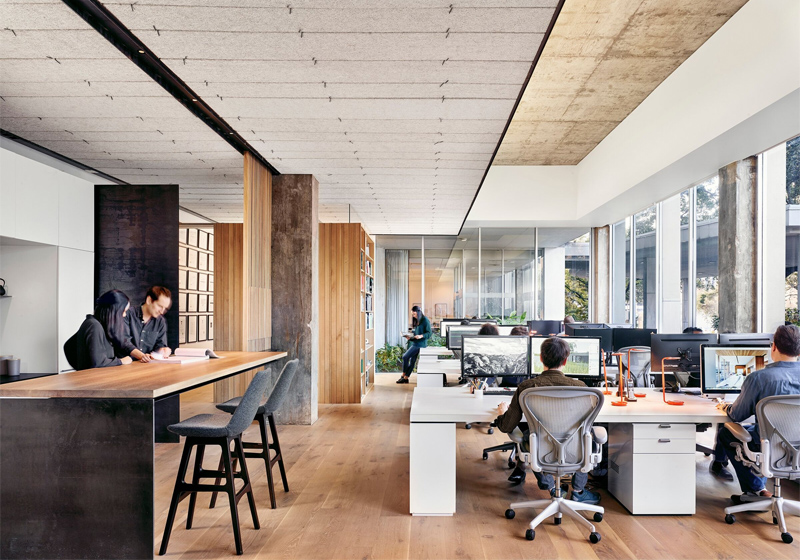
Solution: To avoid these mistakes, businesses should clearly assess their operational requirements, including technical infrastructure, space design, security, and accompanying amenities. It is essential to thoroughly inspect the building’s network systems, electrical wiring, air conditioning, and overall facility quality. At the same time, they should communicate clearly with the landlord or building manager to clarify available services and the possibility of customizing the space.
7. Overlooking fit-out timeline and rent-free period
Many businesses pay attention only to the contract signing date and the rent payment start date, without accurately accounting for the time needed to complete renovations, fit-out, and install equipment in the new space. This process can take anywhere from several weeks to several months, depending on the extent of the renovations. Delays in planning, selecting contractors, or obtaining approvals from the landlord can extend the timeline, resulting in project delays and unexpected costs.
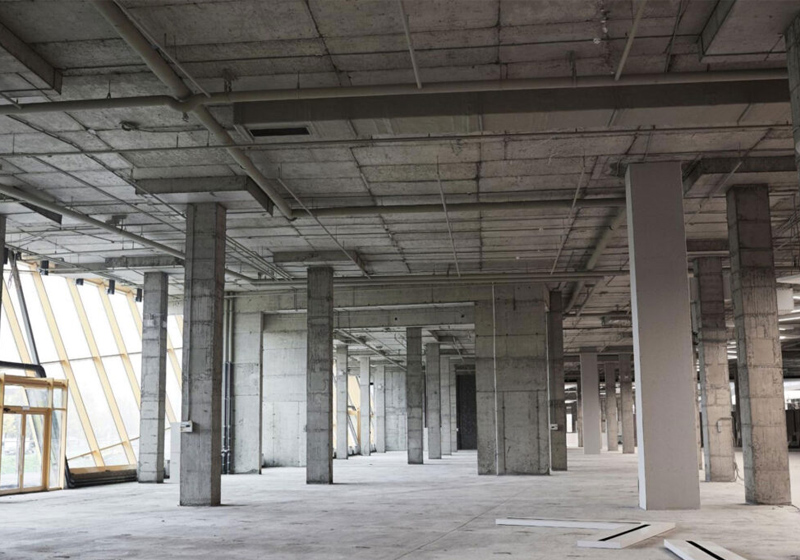
In Vietnam, most commercial office lease contracts include a rent-free period during the interior fit-out phase. This is the time when the landlord allows the tenant to complete office renovations without charging rent before official operations begin. The rent-free period usually lasts from 2 to 8 weeks, depending on the agreement and the scope of the fit-out. Failing to negotiate or overlooking this benefit means the business may have to pay rent for a space that is not yet usable, increasing overall costs.
Solution: To avoid mistakes, businesses should create a detailed plan that includes the estimated time for office renovation and setup. At the same time, they should clearly negotiate the rent-free period with the landlord and include this clause in the contract to prevent unexpected costs.
>> What is Fit Out? How long does it take to Fit Out of the office?
8. No limit on future rental or service charge increases
Many office lease contracts in Vietnam do not clearly specify limits on annual rent or service charge increases. This can put financial pressure on businesses when costs rise suddenly or excessively, exceeding their ability to pay. The absence of this clause also creates risks for operational stability and makes it difficult to budget expenses accurately. Additionally, service fees such as maintenance, cleaning, and security can also increase without proper control, especially in the context of inflation.

Solution:
– Negotiate price increase limits: Request a maximum annual rent increase (e.g., 5 – 7% per year) or fix the rent price for the first 2 – 3 years. Additionally, agree on limits for service fee increases, such as a maximum of 10% per year or adjustments tied to the Consumer Price Index (CPI).
– Include clear terms in the contract: Ensure that price increase clauses are specified clearly (percentage rate, frequency, and effective date). Require advance notice (30 – 60 days) if the landlord intends to adjust the price.
– Market research: Compare rent and service fees of similar buildings to negotiate reasonable increase rates.
Example: A company rents 200m2 in District 1, HCMC at 30 USD/m2/month with a 1 USD/m2/month service fee. Without limits, a 10% rent increase and 20% service fee increase after one year would raise costs by 640 USD/month. On the other hand, limiting the increase to 5% would save 330 USD/month.
9. Not clarifying maintenance responsibilities
Overlooking the maintenance responsibility clause is one of the common office lease mistakes in Vietnam. When the lease agreement does not clearly specify who is responsible for maintaining systems such as air conditioning, electricity, water, elevators, or common areas, businesses may face difficulties when problems arise. Delayed handling or unclear cost responsibility can directly affect operations and lead to unexpected expenses.
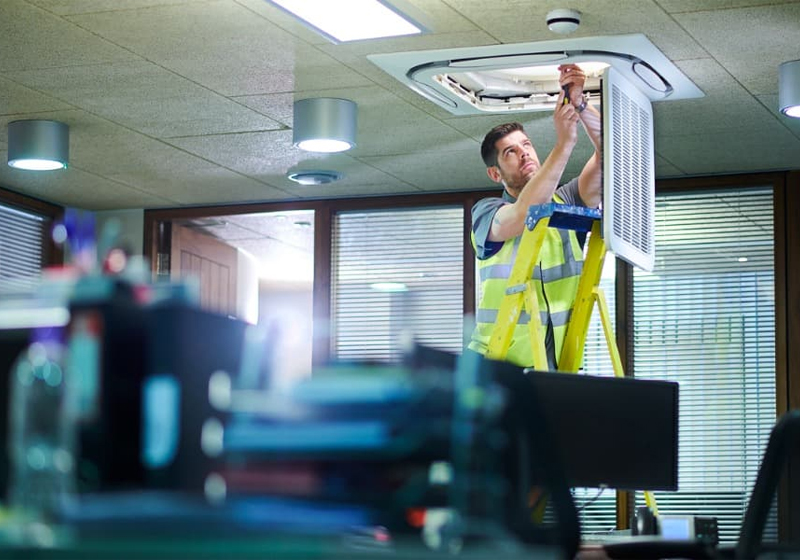
Solution: Businesses should request that maintenance responsibilities be clearly defined in the lease agreement, including:
– Specify maintenance scope: Indicate who is responsible for which components. For example, the landlord handles shared infrastructure (electricity, water, elevators, etc.), while the tenant is responsible for their own installed equipment.
– Response time: Set a maximum time frame for resolving issues (e.g., within 24 – 48 hours from the time of reporting).
– Additional costs: Clarify which party is responsible for covering maintenance or repair expenses in each specific case.
– Regular maintenance: Require the landlord to carry out periodic maintenance of key systems to ensure the office operates smoothly and reliably.
10. No legal or advisory support during lease review
Many businesses negotiate and sign office lease agreements without legal or real estate advisory support. This poses legal and financial risks, especially when the contract contains vague, unfavorable, or unclear terms. Without professional guidance, tenants might miss critical clauses such as early termination, renewal options, hidden fees, or liability for damages, which can lead to unexpected disputes or obligations.

Additionally, foreign businesses or newcomers to the market may face many disadvantages if they do not understand Vietnamese laws. This lack of understanding makes them more likely to face unfair contract terms and trouble protecting their rights.
Solution:
– Always engage an experienced lawyer or real estate consultant to review the contract before signing.
– Work with real estate agents to get market advice, compare rental prices, and negotiate terms with landlords.
– Request a bilingual lease agreement (Vietnamese and English) if you are a foreign business, but note that the Vietnamese version holds greater legal validity under Vietnamese law.
– During the contract review process, the company’s legal and finance departments should be involved to thoroughly assess potential risks and ensure the terms align with the company’s actual operational needs.
11. Renting from landlords without proper licenses or compliance
According to the 2014 Law on Real Estate Business, landlords must have a real estate business license to be legally permitted to offer office leasing services. In addition, office buildings for lease must have a construction permit, fire safety certification, and valid land use rights. If any of these documents are missing, the lease agreement may be rendered invalid, leading to legal risks and operational disruptions. In some cases, businesses may lose their deposit or incur relocation costs if the building is forced to close.

Solution:
– Verify landlord’s legal status: Request to see the landlord’s real estate business license to ensure they are authorized to lease office space.
– Check property documents: Confirm the building has valid construction permits, fire safety certificates, and land use rights.
– Consult legal experts: Have a lawyer review all documents and contracts to ensure compliance with local laws.
– Avoid informal agreements: Insist on formal, written contracts with clear terms and legally required approvals instead of verbal agreements.
– Conduct on-site inspections: Visit the property to verify safety conditions and proper certifications before signing.
– Avoid excessively low rental prices: Be cautious of unusually low rental prices, especially in major cities like Hanoi and Ho Chi Minh City. Such prices may signal that the property lacks proper legal documentation or has safety issues.
In summary, businesses need to pay attention to many important issues to avoid office rental mistakes Vietnam. Understanding legal regulations, lease contract terms, and accurately assessing office conditions will help businesses operate more efficiently and save costs in the long run.
If you are looking for a reputable agency to introduce office spaces and support your business from searching, analyzing, negotiating to signing contracts, Maison Office is a reliable choice.
Contact Maison Office now for a free consultation!



